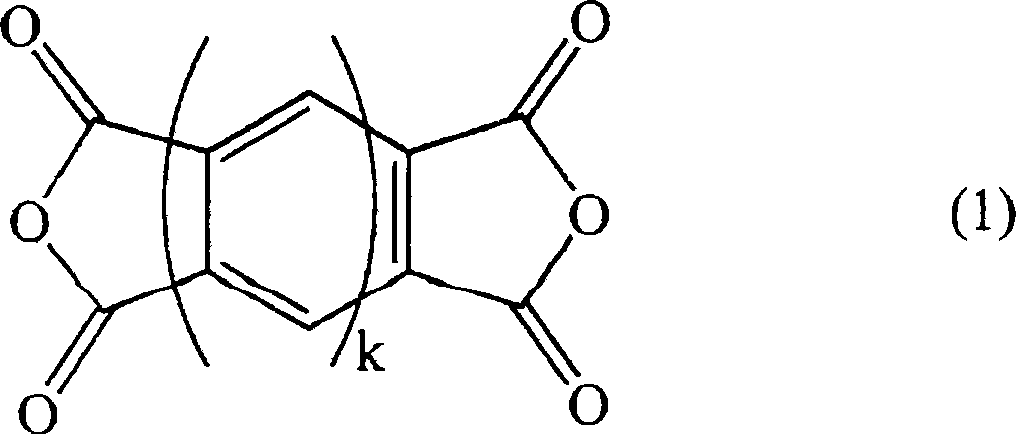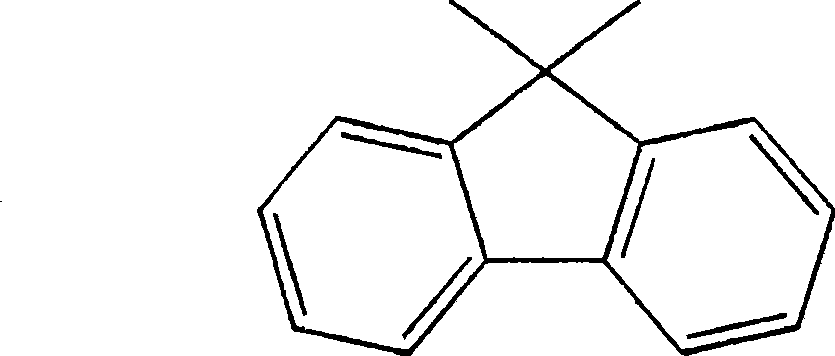Polyester dispersant, process for production of the same, and pigment composition using the same
A technology of dispersants and vinyl polymers, applied in the field of polyester dispersants, which can solve the problems of low viscosity and reduced coating resistance
- Summary
- Abstract
- Description
- Claims
- Application Information
AI Technical Summary
Problems solved by technology
Method used
Image
Examples
Embodiment 1
[0275] In a reaction vessel equipped with a gas introduction pipe, a thermometer, a condenser and a stirrer, 200 parts of n-butyl methacrylate were added, and the reaction vessel was purged with nitrogen. The inside of the reaction container was heated to 80°C, 12 parts of 3-mercapto-1,2-propanediol was added, and the reaction was carried out for 12 hours. 95% reaction was confirmed by solid content measurement. Next, add 12 parts of pyromellitic anhydride, 224 parts of cyclohexanone, and 0.40 parts of 1,8-diazabicyclo-[5.4.0]-7-undecene as a catalyst, and react at 120°C for 7 Hour. It was confirmed by measuring the acid value that 98% or more of the acid anhydride had been half-esterified, and the reaction was terminated to obtain a polyester dispersant with an acid value of 28 and a weight average molecular weight of 5800 (=dispersant 1, the same applies hereinafter).
Embodiment 2~6
[0277] Except having used the raw material and addition amount shown in Table 1, it synthesize|combined by the method similar to Example 1, and obtained the polyester dispersing agent.
Embodiment 7
[0279] 100 parts of n-butyl methacrylate and 100 parts of benzyl methacrylate were added to a reaction vessel equipped with a gas inlet tube, a thermometer, a condenser and a stirrer, and the reaction vessel was purged with nitrogen. The inside of the reaction container was heated to 80°C, and a solution in which 0.1 part of 2,2'-azobisisobutyronitrile was dissolved in 12 parts of 3-mercapto-1,2-propanediol was added, and reacted for 10 hours. 95% reaction was confirmed by solid content measurement. 19 parts of pyromellitic anhydride, 231 parts of cyclohexanone, and 0.40 parts of 1,8-diazabicyclo-[5.4.0]-7-undecene as a catalyst were added and reacted at 120° C. for 7 hours. By measuring the acid value, it was confirmed that more than 98% of the acid anhydride had been half-esterified, and then the reaction was terminated to obtain a polyester dispersant with an acid value of 43 and a weight average molecular weight of 8500.
PUM
| Property | Measurement | Unit |
|---|---|---|
| glass transition temperature | aaaaa | aaaaa |
| glass transition temperature | aaaaa | aaaaa |
Abstract
Description
Claims
Application Information
 Login to View More
Login to View More - R&D
- Intellectual Property
- Life Sciences
- Materials
- Tech Scout
- Unparalleled Data Quality
- Higher Quality Content
- 60% Fewer Hallucinations
Browse by: Latest US Patents, China's latest patents, Technical Efficacy Thesaurus, Application Domain, Technology Topic, Popular Technical Reports.
© 2025 PatSnap. All rights reserved.Legal|Privacy policy|Modern Slavery Act Transparency Statement|Sitemap|About US| Contact US: help@patsnap.com



